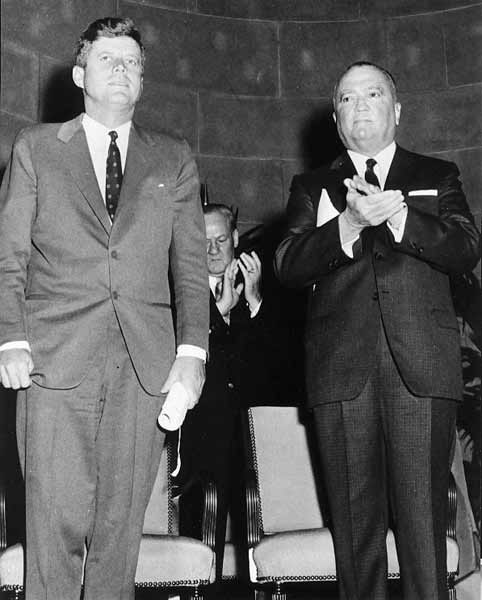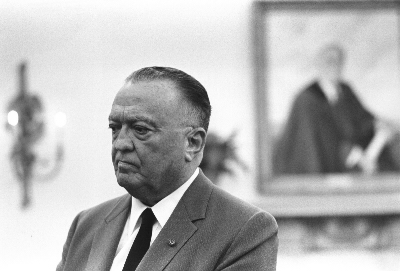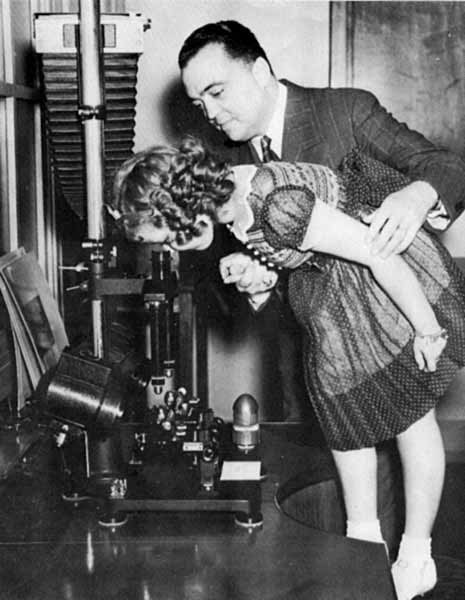


J. Edgar Hoover's Conspiracy of Silence
by Joseph C. Hinson
January 29, 2002
President Bush and John Ashcroft are teaming up to keep the secrets on J. Edgar Hoover buried. Hoover, the once esteemed director of the FBI, has come to the butt of many jokes in recent years over his sexuality as well as alleged cross dressing. These jokes, however, cover a deeper truth, that Hoover was a loose cannon, a paranoiac yielding power over presidents and attorney generals, blackmailing Kings and Kennedys.
The most recent bombshell came in the case of Joe Salvati. Salvati spent 30 years in prison for the 1965 murder of small-time Boston hoodlum Edward ''Teddy'' Deegan in Chelsea, Massachusetts. The chief witness against Salvati was a mob hitman, Joseph "the Animal" Barboza. Salvati owed Barboza money and had indicated he had no intention of paying him. Two days before the murder, on March 10, 1965, FBI agent Paul Rico in the Boston office sent a memo to the Special Agent in Charge advising him that, according to an unidentified informant, Deegan was going to be murdered. The informant said the hit on Deegan had been ordered by Ray Patriarca, the top mob boss of New England, because Deegan had pulled a gun and threatened some people in a restaurant called the Ebb Tide in Revere, Mass. Deegan, according to the informant, would be set up for the hit by a "close associate."
Deegan had been drawn to the scene when he learned
that French and another man had been arrested on a burglary charge. There
had been no arrest; it was just a ruse to get Deegan to the scene. Lt.
Thomas Evans of the Chelsea Police Dept. reported arriving on the murder
scene at 11:30 pm. Aside from the set-up, Evans learned from Chelsea police
Capt. Joseph Kozlowski that around 10 p.m. he had seen a red car with three
men in it parked near the scene of the murder. The first three digits of
the license plate, Kozlowski said, were 404. The plate was bent over
covering the rest of the numbers. The car pulled away when Kozlowski approached
it.
Later, it was learned that this car was registered
to Richard "Romeo" Martin. Ricky French was arrested.
The day after Deegan was shot, Agent Paul Rico sent another memo to the Special Agent in Charge with more dope from his unidentified informant. The informant, Rico reported, told him that Deegan had been hit the night before, that he had been lured to the alley by French who fired the first shot into Deegan. After French shot Deegan two men came out of a door leading from a finance company's offices. They were Ronnie Casessa and Romeo Martin who car had been spotted on the scene and at the Ebb Tide restaurant by Capt. Kozlowski. One of these men fired some additional bullets into Deegan's body. Also present at the scene, according to Rico's snitch, were Jimmy "The Bear" Flemmi and Joe "The Animal" Barboza.
A few days later, on March 19, 1965, an account of the incident was included in a memo from the Special Agent in Charge to FBI Director J. Edgar Hoover. This memo included all the information listed in the above paragraphs and also went into more detail on the politics of the murder as well as the observation that Roy French fired the first shot hitting Deegan in the back of the head.
Yet the Deegan murder was still unresolved some two years later. According to Victor Garo, the attorney who finally won Salvati's release, the FBI did not want to prosecute the men who were actually cited by the informants because they were also informants and the FBI wanted to protect them. They needed a scapegoat and one was offered to them by the stone killer Joe Barboza.
In the spring of 1967 he found himself in jail for a parole violation. He offered to testify against several people who were important to the FBI and to Hoover. This included Ray Patriarca, head of the New England mob, and the killers of Teddy Deegan. Barboza fingered Salvati as the killer of Deegan. His motive was Salvati's refusal to pay some money he owed Barboza, an offense he had compounded by beating up the two thugs Barboza sent to collect.
In October, 1967 Salvati was indicted for the murder of Deegan. The FBI memos identifying the real killers were hidden. The Chelsea police cooperated with the FBI so the report of Capt. Evans was never seen by the jury. In 1968, Salvati, along with Peter Limone, Louis Greco and Henry Tameleo were convicted. And sent to prison It wasn't until January 2001 that Middlesex Superior Court Judge Margaret Hinkle vacated Salvati and Limone's 1968 convictions based on newly found documents that the Boston Federal Bureau of Investigations office under J. Edgar Hoover withheld. Salvati had spent 30 years in prison and three years on parole. Limone spent 33 years in prison. Greco and Tameleo died in prison.
Bush and Ashcroft Team Up in Defense of Hoover
Current Attorney General John Ashcroft doesn't want this story and perhaps more like it to see the light of day. Furthermore, President Bush invoked executive privilege to block a congressional subpoena exploring abuses in the Boston FBI office, prompting the chairman of a House committee to lambaste his fellow Republicans and triggering what one congressman said is the start of ''a constitutional confrontation.'' The Salvati case was just part of this investigation.
Dan Burton, the Indiana Republican who heads the House Government Reform Committee, said, ''You tell the president there's going to be war between the president and this committee." He said this to Carl Thorsen, a deputy assistant attorney general who was attempting to introduce a superior who was testifying. Later, another Congressman said it was the genesis of "a constitutional confrontation."
This tone was shared by both parties and stretched across liberal/conservative lines. Said Burton, "We've got a dictatorial president and a Justice Department that does not want Congress involved. ... Your guy's acting like he's king."
Committee members said the order's sweeping language created a shift in presidential policy and practices dating back to the Harding administration. They complained also that it followed a pattern in which the Bush administration has limited access to presidential historical records, refused to give Congress documents about the vice president's energy task force, and unilaterally announced plans for military commissions that would try suspected terrorists in secret. It also claimed executive privilege in refusing to hand over prosecutors' memos in criminal cases, including an investigation of campaign-finance abuses, saying doing so ''would be contrary to the national interest.''
This seems to be the start of something big. President Bush currently has a huge approval rating. So did his father at one point during his term of office. With the possibility that the tide will turn regarding our treatment of the Taliban detainees in Cuba, this may be the last thing the president needs right now.
One must, of course, ask the obvious question: Why doesn't George Bush and John Ashcroft want this information released? One possible reason is that the president's father asked him to. George the Elder was head of the CIA after Hoover's death. The two agencies have had a notoriously bad relationship over the years. However, Bush evidently had a private meeting with Hoover a week after the JFK assassination. According to a November 29, 1963 memorandum from FBI Director J. Edgar Hoover to the Director of the Bureau of Intelligence and Research at the Department of State refers to the fact that information on the assassination of President Kennedy was 'orally furnished to Mr. George Bush of the Central Intelligence Agency.'"

Kennedy and Hoover were political enemies, not allies. JFK planned to "retire" Hoover after he was re-elected in 1964. Hoover, JFK knew, had a rather large file on him which dated back to the "Inga-Bing" days of the early 40s.
The Salvati miscarriage of justice was part of Hoover's belated war on the mob. For years he had insisted there was no such thing as organized crime. This has been the source of much speculation. Did Hoover, as the top dog of the nation's top crime fighting outfit, simply not know that there was such a thing as organized crime and that it was well organized and very criminal? Or did he know and just turn the other cheek? It is well-known that Hoover and Clyde Tolson, his companion of many years and also a top FBI official, spent many a day at the dog races placing bets.
"The Most Notorious Liar in America"
For almost fifty years, Hoover held virtually unchecked public power, manipulating every president from Franklin D. Roosevelt to Richard Nixon. He kept extensive blackmail files and used illegal wiretaps and hidden microphones to destroy anyone who opposed him. J. Edgar Hoover's obsession with Dr. Martin Luther King, Jr. is well-documented in FBI files. These files show examples such as the FBI calling Marquette University in 1964 to tell them not to award an honorary degree to King. At Springfield College (Mass.) a month later, the FBI told the college that King's SCLC was "Communist affiliated." None of this was true, but Hoover's hatred of King, for whatever reason be it political or racial, was so strong that it did not matter.
In April 1964, Hoover was quoted in the press as having testified that "Communist influence does exist in the civil rights movement." King reacted sharply: "It is very unfortunate that Mr. J. Edgar Hoover, in his claims of alleged Communist infiltration in the civil rights movement, has allowed himself to aid and abet the salacious claims of Southern racists and the extreme right-wing elements."
King added fuel to the fire with the following statement: "It is difficult to accept the word of the FBI on Communist infiltration in the civil rights movement, when they have been so completely ineffectual in resolving the continued mayhem and brutality inflicted upon the Negro in the deep south."
Hoover publicly called Martin Luther King, Jr., "the most notorious liar" in America. Apparently few people believed the old man. King's renown grew and he became Time magazine's Man of the Year and, in December 1964, the recipient of the Nobel Peace Prize. When learning of this, Hoover wrote across a memorandum, "They had to dig deep in the garbage to come up with this one." He and the FBI then Federal Bureau of Investigation began one of the most sweeping electronic-surveillance campaigns in American history. While the bugging led to no evidence of Communism, it did reveal aspects of King's life that both repelled and titillated Hoover and his fellow high-ranking agents, putting into motion an even more vicious campaign to destroy King.
Trying to forge a truce, King set up a meeting with Hoover in December, 1964. According to all accounts, the meeting was exceedingly cordial. Hoover expressed support for the civil rights movement and then turned to what was on his mind -- criticism of the bureau. The meeting consisted of a long monologue by Hoover on the FBI's efforts to protect civil rights demonstrators, enforce the laws in the South, and prevent terrorism. At the end of the meeting, King and Hoover agreed to a public truce.
In secret, Hoover stepped up pressure on King. The FBI had taped King at a hotel having "extramarital and perhaps inter-racial sexual activities." Hoover sent this tape to King's office and threatened to release it publicly if the man did not kill himself. The anonymous letter said in part, "King, there is only one thing left for you to do. You know what it is. You have just 34 days in which to do (this exact number has been selected for a specific reason, it has definite practical significance). You are done. There is but one way out for you. You better take it before your filthy fraudulent self is bared to the nation."
It was thirty four days before King would receive his Nobel Peace Prize.
Hoover and his able assistant William Sullivan had in January of that year agreed that King needed to be replaced with someone "suitable." Alas, the plan didn't work. From the time King accepted the Nobel Peace Prize until his death in 1968, Hoover worked to discredit the man and bring him to ruin.
And we won't even talk about why Hoover did after King's death. That's a rant all unto itself.
In closing, it is peculiar that President Bush and Attorney General Ashcroft would go to such lengths to protect a man who had been discredited to a point already. Again, the question must be asked, "Why?
See Also:
Gerald
Ford: Whore For the FBI? (08/08/2000)
Relevant Web Sites & Online
Sources:
The
FBI's Vendetta Against Martin Luther King, Jr.
Who
Killed Martin Luther King Jr.?
Did
the FBI Play a Role in King's Death?
Bush
Halts Inquiry of FBI and Stirs Up a Firestorm
FBI
Framed A Man They Knew Was Innocent
A
Bush/Hoover Meeting 11/29/1963
Author's
Journey to John Lennon's FBI File By Peter Duffy
"Assassinating"
J. Edgar Hoover
The
Mysterious Origins of J. Edgar Hoover
J.
Edgar Hoover: Gay marriage role model?
The
Dark Side of the Force: J. Edgar Hoover
Elvis
Shot JFK! We Have Proof!

That's just plain creepy.
Arthur Murtagh, former FBI agent, interviewed in 1990 stated; "I certainly do not want to indicate that Hoover did not have some unusual ability in structuring an organization designed to perpetuate a sort of dictatorial control of both the FBI and, so far as he could manage it, the minds of the American citizens: but so did Adolf Hitler."
to
my next rant (when posted)
My
Rants and Raves
The
Joseph C. Hinson Home Page

A great book about a not-so great man.